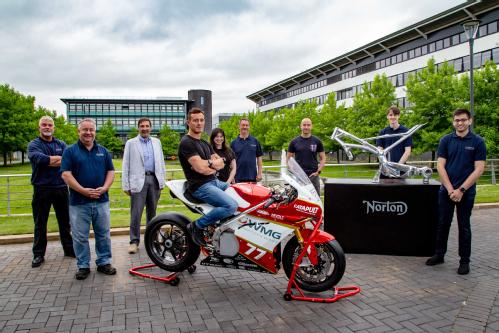Engineering with the experts
Engineering with the experts

The Warwick Moto group of students has developed an impressive electric superbike thanks to support from legendary manufacturer Norton Motorcycles.
Nights out. Beans on toast. Piles of laundry waiting for the next visit back home.
There are some pretty tired cliches out there about student life.
In reality, universities are home to all kinds of amazing things – and people.
And at Warwick, one group of undergraduates has shown just what students can really do.
They’ve made a superbike – an electric one, no less.
Warwick Moto is comprised of 13 students at WMG, an academic department at the University of Warwick that collaborates with industry.
Some of the students are in the first year of their degree while others are in their last; all are joined by leading WMG academics, engineers and researchers, as well as a number of Engineering Doctorate students.
Together, they are working to create an electric bike capable of entering the TT Zero, a race at the Isle of Man TT for zero-emission motorcycles.
And thanks to a partnership with Norton Motorcycles, they unveiled Frontier in 2021 – a remarkable prototype developed in just seven months.
Old principles, new solutions
Norton Motorcycles was born in 1898 when James Landsdowne Norton started out as a supplier of spare bicycle parts in Birmingham.
Four years later, he made his first powered motorcycle. The rest was history.
Fast-forward to today and the modern iteration of the company, based in Solihull, is just as passionate about manufacturing as it ever was.
Now, though, the focus is on electrification.
The firm was awarded funding by Advanced Propulsion Centre 19 in June 2022 for its Zero Emission Norton initiative, which seeks to eliminate the need to compromise on range or performance for electric motorbikes.
The funding comes hot on the heels of Norton’s support of the Warwick Moto project; it donated a high-performance bike frame and invaluable data to the students involved, while also enabling them to consult with its experienced engineers.
The result is Frontier – and it’s quite a result, too.
Fitted to that Norton frame is a 201hp electric powertrain that provides up to 400Nm of torque from a standing start, meaning acceleration and speed characteristics roughly equivalent to a combustion-engine counterpart of around 1,000cc – only slightly less than Norton’s own petrol powertrain.
A huge technical achievement
When Warwick Moto was conceptualised in 2019 by a group of passionate second-year engineering students, the aim was to take a vehicle from design to the track in an ambitious 15 months.
Covid-19 meant the group soon had to hit the brakes, slowing down progress until 2020, when Norton entered the picture and moved things up a gear.
Ever since, on-campus research has been reinforced with input, support, mentoring and technical guidance from Norton’s own designers and engineers – and has also been supported by the WMG Centre High Value Manufacturing Catapult.
The Warwick Moto team developed an electric motorcycle powertrain using a high-performance sports model as a platform.
The electric motor draws power from an immersion-cooled battery pack designed and tested by the students, which is the first of its kind for application in an electric motorcycle.
This cooling system enables the team to operate at a more efficient temperature range by optimising the starting temperature of the dielectric fluid prior to a race or testing, based on the requirements of the track.
The battery boasts a capacity of 16kWh and is designed to last longer thanks to robust thermal management strategies, while also allowing for the larger short-term power peaks required by a racing motorbike.
Particularly impressive is the fact that the battery can be recharged with the common CHAdeMO connector, with fast charging allowing for a 0-80% time of just 32 minutes.
Frontier was revealed in June 2021 after just seven months of development – almost half the initial target duration – but the proud moment was by no means the end of the project.
Although TT Zero has been shelved until 2024 at the earliest, the Warwick Moto team hopes its road racer Tom Weeden will be able to compete on the vehicle sometime soon.
Meanwhile at Norton, work continues to develop the next generation of electric motorbikes.
Dr Robert Hentschel, CEO of Norton Motorcycles, said: “We’re thrilled to be able to support the engineers of the future, who have been developing tomorrow’s technology today on the basis of a Norton frame.
“Our team of designers and engineers have been very interested to observe the project taking shape and support the student team wherever possible with advice and guidance.”
